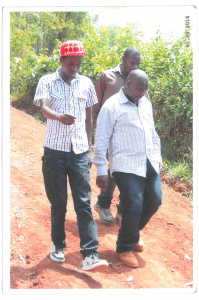In 2002, a 20-year-old young man packed his bags and set out for Nairobi in search of greener pastures. David Irungu ended up finding a job at Nairobi’s Kariokor area as waiter at an eatery for less than Ksh300 day. Years later, he owns property in Nairobi and bought the eatery he had worked for.
Irungu is one of the success stories of self-help groups, which are churning out millionaires in Kenya. “I was a waiter here (at my now hotel) for over six years. At some point in 2010 I started a small side business of roasting meat just outside the hotel. Then in 2012 I met a friend, Nancy Wairimu, who asked me to join their chama so I can save up some money and later invest in starting my own business,” says Irungu.
Irungu, however, did not feel ready yet to join Nancy’s Self Help Group. He learnt about programme at Equity Bank that supports chamas, where they could save at least Sh200 a week each, and after two months qualify for a loan up to five-times their savings.
Also See: How to turn your passion into profitable business
Armed with this information, Irungu set out to start a Self Help Group with two of his friends, who included Nancy’s husband.
Kamuiru Self Help Group started with three people – Kariuki Benson, Mugo Elijah and Irungu himself. The name Kamuiru was coined from the first letters of our names. Soon they qualified for about Ksh50,000 loan.
“At around this time my employer at the hotel planned to leave the business, and I knew I was well-equipped to run it if he left. I took the Ksh50,000 loan under Kamuiru Self Help Group and started my eatery just next to the hotel where I sold matumbo,” he says.
Irungu and his friends brought more people into their chama and it has 20 members, four years later. “We took in only people who shared our vision,” he says. In fact, to be a member of Kamuiru Self Help Group, you have to ascribe to their Christian principles.
With twenty members, the men began strategizing on new investment opportunities. “All along we had been practicing table banking, where members borrow from the existing funds to cater for their needs, and pay back with 15 percent interest. This helped so much in getting our individual businesses up and running, as it is not easy getting a loan anywhere without security,” he says.
Working Smart: How to make money while you sleep
Bernard Njoroge, a member of the group, explains that as a young person with nothing, it was impossible to get a loan from any financial institution. “Once you are part of a chama, it becomes your guarantor, and you get easier access to funds at a much lower interest rate. I managed to move from selling shoes for other traders at a commission to purchasing my own stock and setting up shop,” Njoroge says.

Table banking kílled two birds; the group members got funding to expand their business and the chama accounts grew fatter.
They were doing well, and now needed to expand the funds pool. It is at this point that they approached Youth Enterprise Development Fund (YEDF).
At the YEDF, Kamuiru Self Help Group took a loan of Ksh100,000, with multiplied through table banking. The group paid back and request for double the amount. YEDF and Equity Bank provided officials who closely monitored and advised the group on business and finances.
At around this time, Irungu’s employer at the restaurant was ready to leave and put it up for sale for Ksh300,000. “I secured a loan under the group and bought the establishment,” he says.
This marked the beginning of a series of successful ventures for Irungu. ‘I renovated the place, and realized it had more space. I constructed other three small business spaces and rented them out,” he says.
Just next to Irungu’s restaurant at Kariokor sits a chain of small businesses: butchery, eatery, and M-Pesa shop, owned by Benson Kariuki, a member of the chama. All members have thriving businesses.
Some members were boda riders earning Ksh400 per day and now they each own their own fleet of motorbikes.
In 2014 when they started each member was contributing Ksh100 every week and that has grown to Ksh850: Ksh200 goes to their Equity Bank kitty; Ksh300 goes to a company they plan to launch; Ksh300 to their Kamuiru Welfare Account and Ksh50 pays for the meeting space.
Recently, the group purchased two parcels of land in Ruiru, going for Ksh1 Million, becoming their first land investment as a group. Kamuiru Self Help now boasts about Ksh2 million in savings. “We are still doing our market research on the best investment,” says Irungu.

















Leave a comment